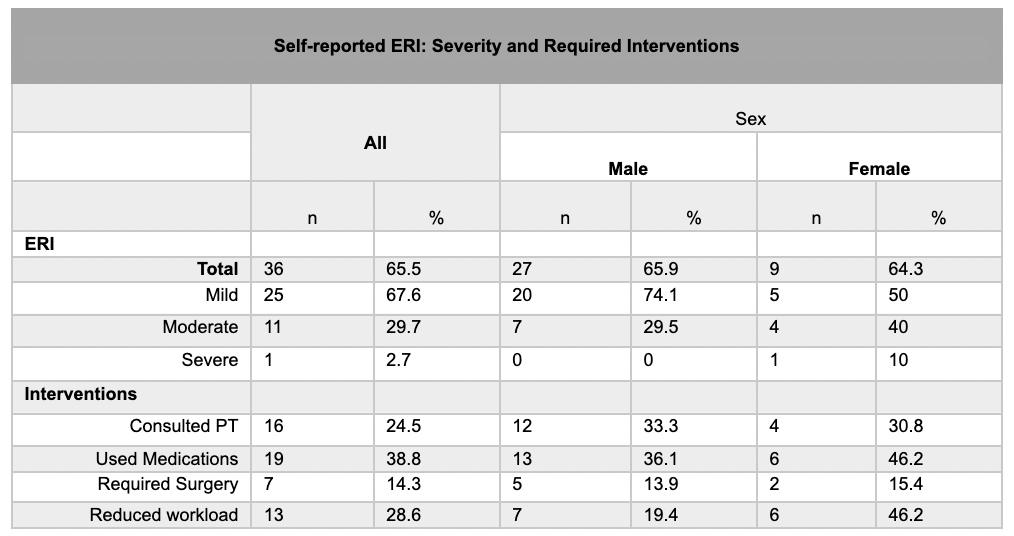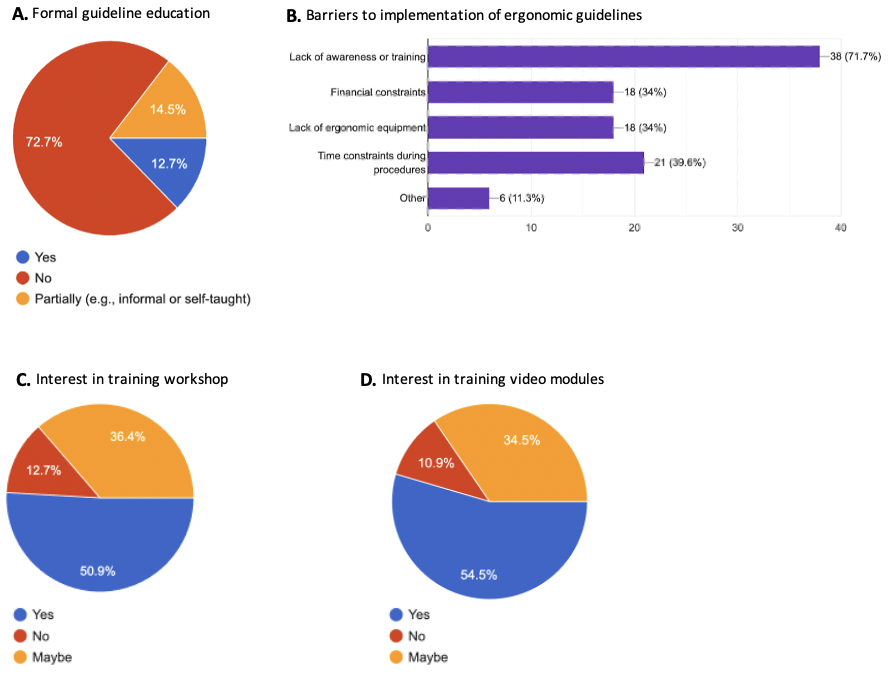Monday Poster Session
Category: General Endoscopy
P2987 - The Rhode Island Study on Ergonomics (RISE): A Statewide Prevalence Survey of Endoscopy-Related Injuries Among Gastroenterologists
Monday, October 27, 2025
10:30 AM - 4:00 PM PDT
Location: Exhibit Hall

Emily L. Romanoff, MD
Brown University / Rhode Island Hospital
Providence, RI
Presenting Author(s)
Emily L. Romanoff, MD1, Amer B. Malik, MD2
1Brown University / Rhode Island Hospital, Providence, RI; 2Warren Alpert Medical School of Brown University, Providence, RI
Introduction: Endoscopy-related injuries (ERIs) are highly prevalent among gastroenterologists, despite the release of formal ergonomic guidelines. Several studies have demonstrated the burden of ERIs through survey data where participants were recruited via national conferences or professional societies. In these studies response rates ranged from 10.7% - 34.4%, thereby imposing a self-selection bias limiting the generalizability of the results. To address this gap we completed a statewide, cross-sectional prevalence study with near-complete participation among practicing gastroenterologists in Rhode island. Our goals were to: (1) determine the prevalence, chronicity, and anatomical distribution of ERIs; (2) identify preventative measures being implemented; and (3) evaluate familiarity with the formal ergonomic guidelines and gauge interest in future ergonomic training initiatives.
Methods: A 36-item electronic survey was distributed to all 59 gastroenterologists across Rhode Island at multiple private practices and academic medical centers between January and May 2025. Study data were collected, de-identified, and managed via a password-secure collection tool. Descriptive statistics were performed to evaluate the prevalence of ERI, awareness of ergonomic guidelines, and willingness to partake in formal ergonomic training.
Results: Of the 59 gastroenterologists contacted, 56 responded (94.9%), and 53 surveys were fully completed. Overall, 63.6% of gastroenterologists reported experiencing an ERI, with 59.5% reporting onset after 5 years in practice, with 23.6% of ERIs lasting ≥6 months and 24.5% requiring care from physical therapists. Despite the prevalence of ERIs, 58.2% of respondents reported receiving no formal ergonomic training, and 45.5% were unaware of any formal ergonomic guidelines. The most commonly cited barrier to implementing ergonomic practices was lack of awareness and training (71.7%). Most respondents expressed interest in further education through video modules (89.0%) or in-person workshops (87.3%).
Discussion: The RISE Study provides a comprehensive, nearly population-level snapshot of ERI prevalence and ergonomic awareness among gastroenterologists in Rhode Island. Our findings confirm a high burden of ERI, often occurring later in physicians’ careers, and reveal a significant gap in formal ergonomic education and institutional support. Our results demonstrate a strong willingness among practicing gastroenterologists to engage in further ergonomic training.

Figure: Table 1. This table shows the self-reported prevalence of Endoscopy-Related Injuries (ERIs) among respondents, stratified by sex. The prevalence of various interventions including consultation with physical therapy (PT), use of medications, surgical interventions, and reducing endoscopy caseload is also reported.

Figure: Figure 1: A. The frequency (%) with which gastroenterologists report having had formal training on ergonomic guidelines. B. The proportions (%) at which gastroenterologists report various barriers to implementing ergonomic guidelines in their endoscopy units. C. The proportion (%) of gastroenterologists who would be interested in future workshops or training programs focused on ergonomics in endoscopy and avoidance of ERIs. D. The proportion (%) of gastroenterologists who would be interested in watching a short ( <20 minutes) educational module focused on ergonomics in endoscopy.
Disclosures:
Emily Romanoff indicated no relevant financial relationships.
Amer Malik indicated no relevant financial relationships.
Emily L. Romanoff, MD1, Amer B. Malik, MD2. P2987 - The Rhode Island Study on Ergonomics (RISE): A Statewide Prevalence Survey of Endoscopy-Related Injuries Among Gastroenterologists, ACG 2025 Annual Scientific Meeting Abstracts. Phoenix, AZ: American College of Gastroenterology.
1Brown University / Rhode Island Hospital, Providence, RI; 2Warren Alpert Medical School of Brown University, Providence, RI
Introduction: Endoscopy-related injuries (ERIs) are highly prevalent among gastroenterologists, despite the release of formal ergonomic guidelines. Several studies have demonstrated the burden of ERIs through survey data where participants were recruited via national conferences or professional societies. In these studies response rates ranged from 10.7% - 34.4%, thereby imposing a self-selection bias limiting the generalizability of the results. To address this gap we completed a statewide, cross-sectional prevalence study with near-complete participation among practicing gastroenterologists in Rhode island. Our goals were to: (1) determine the prevalence, chronicity, and anatomical distribution of ERIs; (2) identify preventative measures being implemented; and (3) evaluate familiarity with the formal ergonomic guidelines and gauge interest in future ergonomic training initiatives.
Methods: A 36-item electronic survey was distributed to all 59 gastroenterologists across Rhode Island at multiple private practices and academic medical centers between January and May 2025. Study data were collected, de-identified, and managed via a password-secure collection tool. Descriptive statistics were performed to evaluate the prevalence of ERI, awareness of ergonomic guidelines, and willingness to partake in formal ergonomic training.
Results: Of the 59 gastroenterologists contacted, 56 responded (94.9%), and 53 surveys were fully completed. Overall, 63.6% of gastroenterologists reported experiencing an ERI, with 59.5% reporting onset after 5 years in practice, with 23.6% of ERIs lasting ≥6 months and 24.5% requiring care from physical therapists. Despite the prevalence of ERIs, 58.2% of respondents reported receiving no formal ergonomic training, and 45.5% were unaware of any formal ergonomic guidelines. The most commonly cited barrier to implementing ergonomic practices was lack of awareness and training (71.7%). Most respondents expressed interest in further education through video modules (89.0%) or in-person workshops (87.3%).
Discussion: The RISE Study provides a comprehensive, nearly population-level snapshot of ERI prevalence and ergonomic awareness among gastroenterologists in Rhode Island. Our findings confirm a high burden of ERI, often occurring later in physicians’ careers, and reveal a significant gap in formal ergonomic education and institutional support. Our results demonstrate a strong willingness among practicing gastroenterologists to engage in further ergonomic training.

Figure: Table 1. This table shows the self-reported prevalence of Endoscopy-Related Injuries (ERIs) among respondents, stratified by sex. The prevalence of various interventions including consultation with physical therapy (PT), use of medications, surgical interventions, and reducing endoscopy caseload is also reported.

Figure: Figure 1: A. The frequency (%) with which gastroenterologists report having had formal training on ergonomic guidelines. B. The proportions (%) at which gastroenterologists report various barriers to implementing ergonomic guidelines in their endoscopy units. C. The proportion (%) of gastroenterologists who would be interested in future workshops or training programs focused on ergonomics in endoscopy and avoidance of ERIs. D. The proportion (%) of gastroenterologists who would be interested in watching a short ( <20 minutes) educational module focused on ergonomics in endoscopy.
Disclosures:
Emily Romanoff indicated no relevant financial relationships.
Amer Malik indicated no relevant financial relationships.
Emily L. Romanoff, MD1, Amer B. Malik, MD2. P2987 - The Rhode Island Study on Ergonomics (RISE): A Statewide Prevalence Survey of Endoscopy-Related Injuries Among Gastroenterologists, ACG 2025 Annual Scientific Meeting Abstracts. Phoenix, AZ: American College of Gastroenterology.

